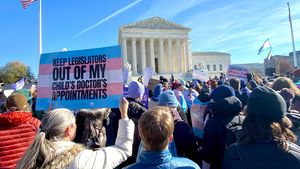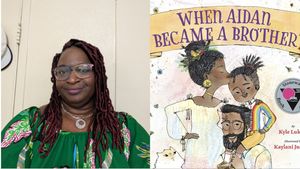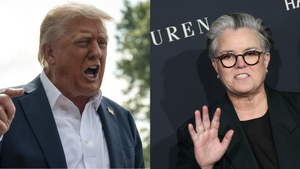Photography by JUCO
Last week, OUT100 honoree and cover star Sam Smith became the first U.K. male artist to receive Grammy nominations in the "big four" categories. His debut album, In the Lonely Hour, was nominated for Album of the Year, his hit single "Stay With Me" was nominated for Record and Song of the Year, and Smith himself got a nod for Best New Artist. Meanwhile, outside the general categories, In the Lonely Hour was nominated for Best Pop Vocal Album, and "Stay With Me" is up for Best Pop Solo Performance.
Given the six noms under his belt and the fact that he's the first male artist in 34 years to score nominations in the "big four," it's unlikely that Smith will go home empty-handed. And after his banner year and myriad accolades (including a recent American Music Award for Favorite Male Artist), why should he? As we concluded in our OUT100 cover story, we've never had a male singer achieve this level of worldwide success after publicly coming out. Whether that's a refreshing sign of the times, a reflection of Smith's undeniable talent, or both, it's worth celebrating.
Here, in these exclusive outtakes from our cover story, Smith discusses fame, freedom, childhood performances in his kitchen, and why he'll always relate more to female singers.
On being himself:
"I feel no pressure to live up to anything. I'm able to be myself. I say what I think, act how I want to act, post what I want to post. There's no one telling me to do this, lose weight, look like this, sing like this, write songs like that. I've just been allowed to be me, and from all the nightmares you hear about the industry from a young age, I never thought that would be the case.
On being openly gay, happy, and successful:
"My aim is to tell people how good it's been for me so that, hopefully, gay men or parents who have gay children can look at my story and think, Wow, that's how it should be. That's what we can work towards. That's been my whole motive--to not make it a talking point. My music should be a talking point. My voice should be a talking point... I was angry that what I was doing was seen as a risk by some because I've had such a beautiful upbringing. I'm so aware of how lucky my life has been in terms of my sexuality and the way that with my family and friends it has never been an issue or a talking point."
On the SNL breakout performance:
"Performing on Saturday Night Live was horrifically frightening. But the second it ended, the second I knew that I hadn't started screeching during a song, I had the best celebration ever. It was possibly one of the happiest moments of my life. I would say SNL was what broke me in America."
On why the divas matter:
"As a kid, I loved Whitney Houston, Chaka Khan, Celine Dion. I was obsessed with people that would sing their hearts out. And then as I got older, I listened to the lyrics. I remember being 11 years old and my dad bought Amy Winehouse's record and we'd listen to it in the car. Her song 'You Sent Me Flying' was probably my first introduction to songwriting and people pouring their hearts out into music.
"I think part of the reason I loved female singers [growing up] is that I could relate more to what they were talking about than to what guys were talking about. You don't hear guys talking about insecurities and pain and what some men actually think are female traits. Just because I'm in touch with my feminine side and can talk about my emotions and fears and loneliness and things that I hope for doesn't make me a weaker man. I think that makes me a stronger man."
On why mum matters:
"I remember at the end of the night when mum had a bit to drink and everyone had finished their pudding, she'd say, 'Sam, get up on the stage [in our kitchen] and sing us a song.' And I used to just want to kill her afterwards. Her argument all the time was, 'I'm just so proud of you.' "
On being in love:
"This album is my proof to everyone I've known that I have been in love, and that I can talk about love, and that I do know what I'm talking about."
On being a nobody:
"When you're writing and no one knows who you are, you can talk about whatever you want. When I was in the studio, I completely forgot in a year's time that my face was going to be plastered around major cities with the word LONELY underneath it. When it did happen, it was like, But it's a risk I'm going to forever take until I stop taking music, because the rewards are so amazing."
On being relatable:
"I could sing every note in the book, but the guy who's a builder down the street who can't sing will never be able to sing a song that I sing if I'm ad-libbing all over it and doing ridiculous things. I make my music relatable because, that way, it reaches everybody. For me, that's what music is about."
On reaching the masses:
"Music is about reaching the masses, having a message, getting through to everyone, and trying to make some sort of difference. Music, to me, is that powerful."
On making a statement:
"Just like I did with In the Lonely Hour, I am looking for a way to make a statement on my next project. I don't quite know what it is yet, but as a man--as a gay man--I want to make a statement."
The 57th Annual GRAMMY Awards telecast will take place live from STAPLES Center in Los Angeles on Sunday, February 8, 2015.













































































